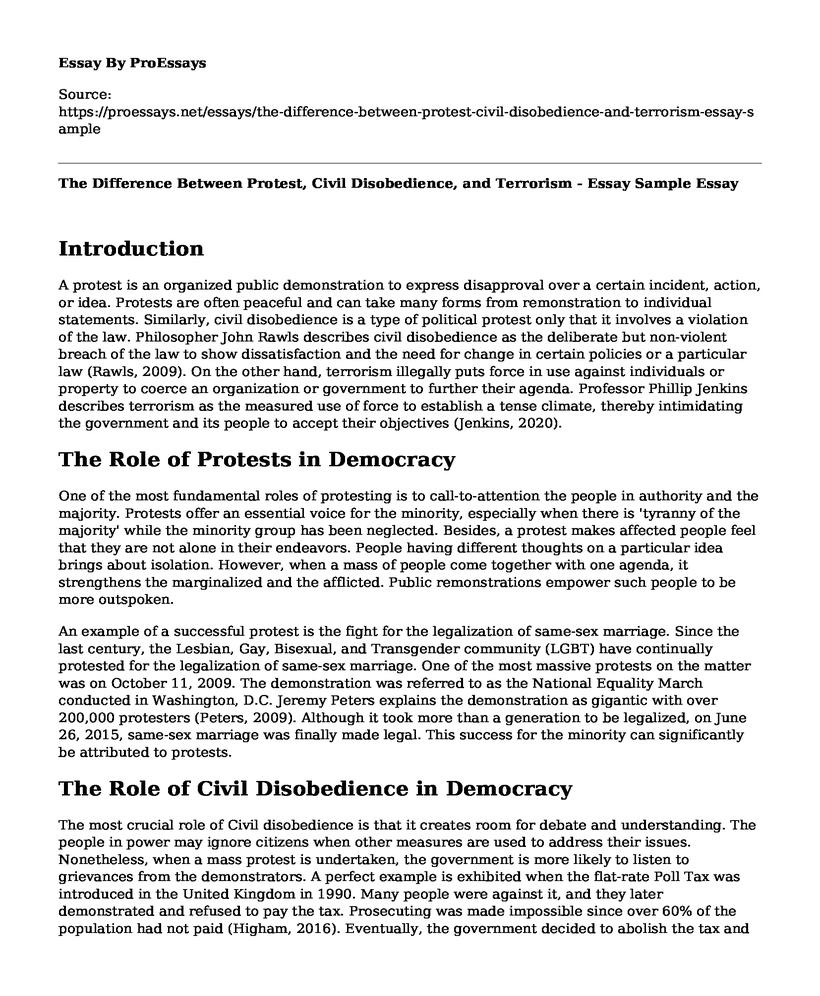Introduction
A protest is an organized public demonstration to express disapproval over a certain incident, action, or idea. Protests are often peaceful and can take many forms from remonstration to individual statements. Similarly, civil disobedience is a type of political protest only that it involves a violation of the law. Philosopher John Rawls describes civil disobedience as the deliberate but non-violent breach of the law to show dissatisfaction and the need for change in certain policies or a particular law (Rawls, 2009). On the other hand, terrorism illegally puts force in use against individuals or property to coerce an organization or government to further their agenda. Professor Phillip Jenkins describes terrorism as the measured use of force to establish a tense climate, thereby intimidating the government and its people to accept their objectives (Jenkins, 2020).
The Role of Protests in Democracy
One of the most fundamental roles of protesting is to call-to-attention the people in authority and the majority. Protests offer an essential voice for the minority, especially when there is 'tyranny of the majority' while the minority group has been neglected. Besides, a protest makes affected people feel that they are not alone in their endeavors. People having different thoughts on a particular idea brings about isolation. However, when a mass of people come together with one agenda, it strengthens the marginalized and the afflicted. Public remonstrations empower such people to be more outspoken.
An example of a successful protest is the fight for the legalization of same-sex marriage. Since the last century, the Lesbian, Gay, Bisexual, and Transgender community (LGBT) have continually protested for the legalization of same-sex marriage. One of the most massive protests on the matter was on October 11, 2009. The demonstration was referred to as the National Equality March conducted in Washington, D.C. Jeremy Peters explains the demonstration as gigantic with over 200,000 protesters (Peters, 2009). Although it took more than a generation to be legalized, on June 26, 2015, same-sex marriage was finally made legal. This success for the minority can significantly be attributed to protests.
The Role of Civil Disobedience in Democracy
The most crucial role of Civil disobedience is that it creates room for debate and understanding. The people in power may ignore citizens when other measures are used to address their issues. Nonetheless, when a mass protest is undertaken, the government is more likely to listen to grievances from the demonstrators. A perfect example is exhibited when the flat-rate Poll Tax was introduced in the United Kingdom in 1990. Many people were against it, and they later demonstrated and refused to pay the tax. Prosecuting was made impossible since over 60% of the population had not paid (Higham, 2016). Eventually, the government decided to abolish the tax and came up with a more considerable tax rate referred to as the Council Tax.
The Role of Terrorism in Democracy
Terrorism does not benefit democracy in any way. It does the opposite by undermining democratic values. With the increase in terrorist establishments and networks, terrorism continues to destabilize democratic governments. The attack on June 12, 2016, in Orlando at a club, leading to the death of 49 people and leaving others injured in a shooting spree, is a debilitating example of how terrorism undermines democracy. (Fantz et al., 2016)
References
Rawls PJ. Chapter 6. Duty and Obligation. In: A Theory of Justice: Original Edition. Massachusetts: Belknap Press; 2009. p. 363-367.
Jenkins JP. Terrorism [Internet]. 2020 [cited 2020Aug3]. Available from: https://www.britannica.com/topic/terrorismPeters JW. Gay Rights Marchers Press Cause in Washington [Internet]. The New York Times. The New York Times; 2009 [cited 2020Aug3]. Available from: https://www.nytimes.com/2009/10/12/us/politics/12protest.html
Higham N. National Archives: Thatcher's poll tax miscalculation [Internet]. BBC News. BBC; 2016 [cited 2020Aug3]. Available from: https://www.bbc.com/news/uk-38382416
Fantz A, Karimi F, McLaughlin EC. Forty-nine killed in Florida nightclub terror attack [Internet]. CNN. Cable News Network; 2016 [cited 2020Aug3]. Available from: https://edition.cnn.com/2016/06/12/us/orlando-nightclub-shooting/index.html
Cite this page
The Difference Between Protest, Civil Disobedience, and Terrorism - Essay Sample. (2023, May 19). Retrieved from https://proessays.net/essays/the-difference-between-protest-civil-disobedience-and-terrorism-essay-sample
If you are the original author of this essay and no longer wish to have it published on the ProEssays website, please click below to request its removal:
- Paper Example on Cyber Bullying as Ethical Issue
- The Migrant Caravan From Honduras Essay Example
- Psychoactive Substance Abuse Essay Example
- Evolution of Immigration Policies: Asian & Mexican Immigrants - Essay Sample
- Essay Example on African Migration: From Slavery to Freedom in America
- Paper Sample on White Superiority Over Black: 12 Years a Slave Showcases Brutal History
- Sustainable Goal Research Paper Example







